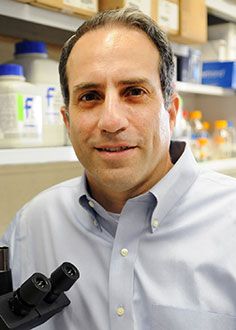
WASHINGTON (April 4, 2013) – Jeffrey Bethony, Ph.D., associate professor in the department of microbiology, immunology, and tropical medicine at the George Washington University (GW) School of Medicine and Health Sciences, was invited to speak on the role of vaccines in control of schistosomiasis at an international meeting of leading experts, jointly held by the Bill and Melinda Gates Foundation and the National Institute of Allergy and Infectious Diseases (NIAID) at the National Institutes of Health.
Schistosomiasis, a disease infecting more than 200 million people worldwide, is caused by parasitic worms. At the meeting, Bethony spoke about the vaccine candidate Schistosoma mansoni tetraspanin (Sm-TSP-2), which he has published on extensively as a GW faculty member, including a cover article in Nature Medicine (2006). Sm-TSP-2 is considered a potential candidate vaccine antigen for clinical development by the Bill and Melinda Gates Foundation. Bethony holds an R56 grant, a high priority, short-term project award, from the NIAID for the development of Sm-TSP-2 to further his research.
The global convening of experts on schistosomiasis, “Schistosomiasis Elimination Strategy and Potential Role of Vaccine in Achieving Global Health Goals,” was held March 12-13, 2013 in Seattle, Wash. and aimed to help guide strategic priorities for research and development to attain global impact goals. The meeting focused on the context of current schistosomiasis control program strategies, unmet needs, and the potential role of schistosomiasis vaccines, their target product profile(s), technical feasibility, and likelihood of technical success. By engaging in implementation programs, experts hope to understand whether there is scope and utility for a vaccine and what performance characteristics would be required. The convening facilitated interaction between researchers and field program leaders in order to understand whether and how a vaccine would address a strategic need for schistosomiasis elimination programs.


